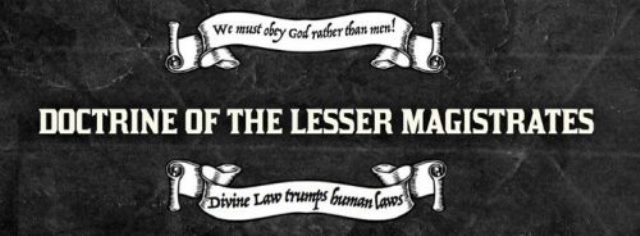
What is the Lesser Magistrate Doctrine?
The Lesser Magistrate Doctrine teaches that when the superior or higher ranking civil authority makes unjust/immoral law, policy, or court opinion – the lower or lesser ranking civil authority has both the God-given right and duty to refuse obedience to that superior authority; and if necessary, actively resist the superior authority.
The doctrine was first formalized by Christian men in Magdeburg, Germany in 1550.
The lesser magistrate doctrine is rooted in the historic Christian doctrine of interposition. Interposition is where one steps into the gap – placing themselves in between the oppressor and his intended victim. Interposition can take place verbally or physically.
The law of God is the objective standard to which all men and all governments of men are accountable. If civil authorities make law, policy, or court opinion that is contrary to His law – the lesser magistrates are to interpose and stop the evil.
America’s founders established this nation as a true federalism. In a true federalism there are multiple levels of government and multiple branches on each level. They did this because they held to a Christian view of man – that he is wicked and in need of a Savior.
They did not want power to rest in one man or a small group of men.
The intent, therefore, of federalism is: if any one branch begins to play the tyrant, it is the duty of the other branches to interpose and resist that branch – and stop the evil. The duty of the people is to rally with the interposing magistrates.
All public authorities (magistrates) possess lawful authority. If federal authorities do wrong, it is the duty of state, county, and local authorities to step in and stop the evil. If state authorities do wrong, it is the duty of county and local officials to step in and stop the evil.
State, county, and local magistrates take an oath to uphold both their State Constitution and the U.S. Constitution. They do not take an oath of subservience to the federal government, nor do they take an oath to blindly obey the authority above them.
Rather, they take an oath to uphold the constitutions. If therefore, another authority makes law, policy, or court opinion repugnant to the state or federal constitutions – they should not obey them.
God has established four realms of government to which He delegates authority. They are: (1) self-government; (2) family government; (3) church government; and (4) civil government. Each has its own role, function, and limits.
The authority an individual possesses in any one of these four realms of government is delegated authority. In other words, they derive their authority from God. Their authority is not autonomous or unconditional. Their authority is God-given, and thus, they have a duty to govern in accordance with His rule.
When someone in authority makes laws or decrees contrary to God’s law, they are in rebellion to God’s rule. Those under their authority are NOT to obey them when they do this. They may even have to actively resist them.